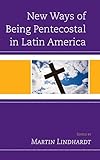New ways of being pentecostal in Latin America / edited by Martin Lindhardt.
Material type: TextPublisher: Lanham : Lexington Books, [2016]Description: 1 online resource (251 pages)Content type:
TextPublisher: Lanham : Lexington Books, [2016]Description: 1 online resource (251 pages)Content type: - 9780739196564
- 0739196561
- 278/.083 23
- BR1644.5.L29
- online - EBSCO
| Item type | Current library | Call number | URL | Status | Notes | Barcode | |
|---|---|---|---|---|---|---|---|
 eBook
eBook
|
Biblioteca "Angelicum" Pont. Univ. S.Tommaso d'Aquino Nuvola online | online - EBSCO (Browse shelf(Opens below)) | Online access | Not for loan (Accesso limitato) | Accesso per gli utenti autorizzati / Access for authorized users | (ebsco)1205155 |
Online resource; title from PDF title page (EBSCO, viewed March 28, 2016).
Includes bibliographical references and index.
The explosive growth of Pentecostalism has radically transformed Latin America's religious landscape within the last half century or so. In a region where Catholicism reigned hegemonic for centuries, the expansion of Pentecostalism has now resulted in a situation of religious pluralism and competition, bearing much more resemblance to the United States than to the Iberian motherlands. Furthermore, the fierce competition from Pentecostal churches has inspired significant renewals of Latin American Catholicism, most notably the growth of a Catholic Charismatic movement. However, another and more recent source of religious pluralism and diversity in Latin America is an increasing pluralization and diversification of Pentecostalism itself and of the ways in which individual Pentecostals exercise their faith. By carefully exploring this diversification, the book at hand breaks new ground in the literature on Latin American Christianity. Particular attention is focused on new ways of being Pentecostal and on the consequences of recent transformations of Christianity for individuals, faith communities and societies. More specifically, the chapters of the book look into certain transformations of Pentecostalism such as: theological renewals and new kinds of religious competition between Pentecostal churches; a growing political and civic engagement of Pentecostals; an observed de-institutionalization of Pentecostal religious life and the negotiation individual Pentecostal identities, composed of multiple intra- and extra-ecclesial points of identification; and the emergence of new generations of Pentecostals (children of Pentecostal parents), many of whom have higher levels of education and higher incomes than the previous generations within their churches. In addition, Catholic responses to Pentecostal competition are also addressed in several chapters of the book.


